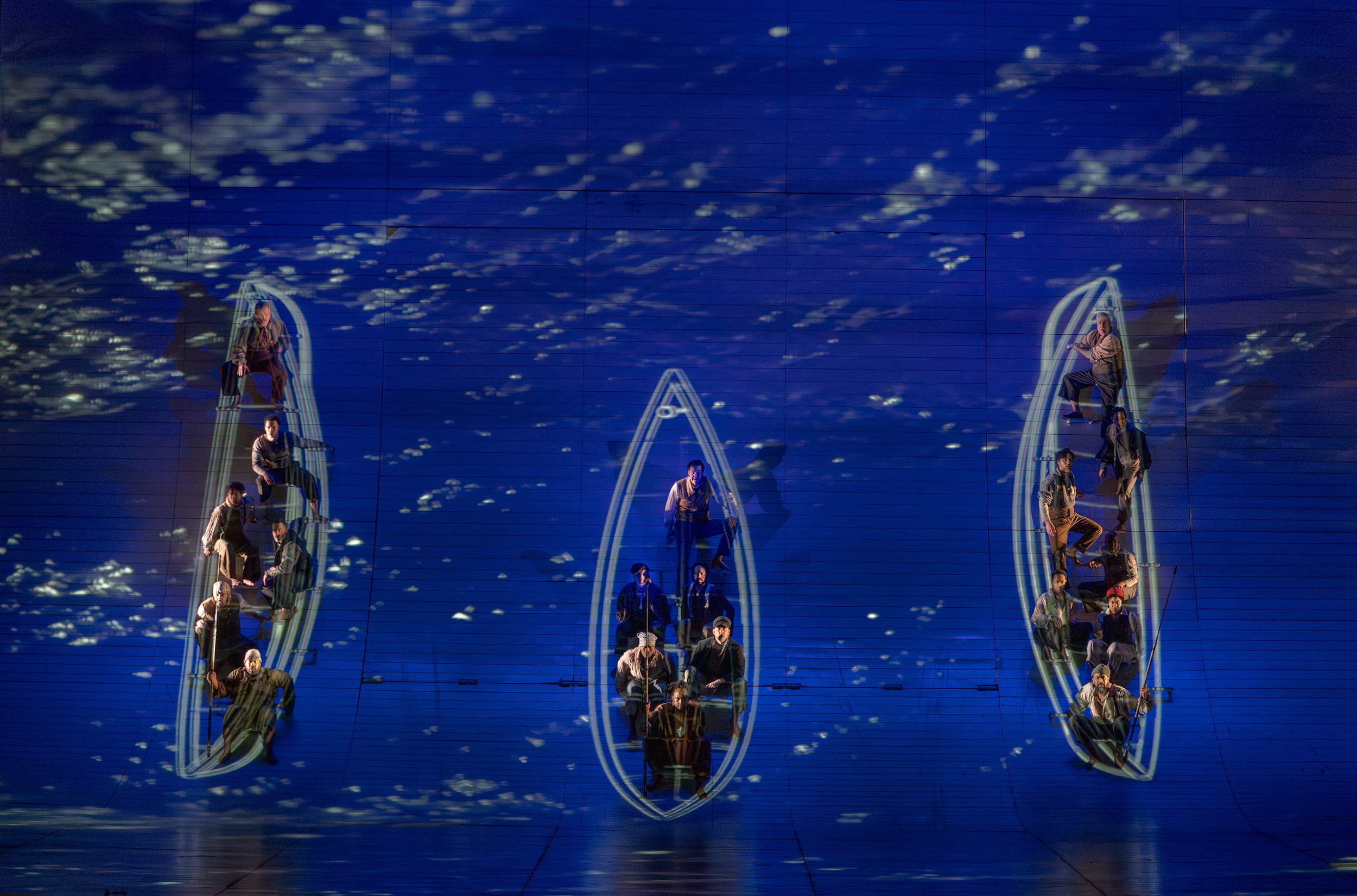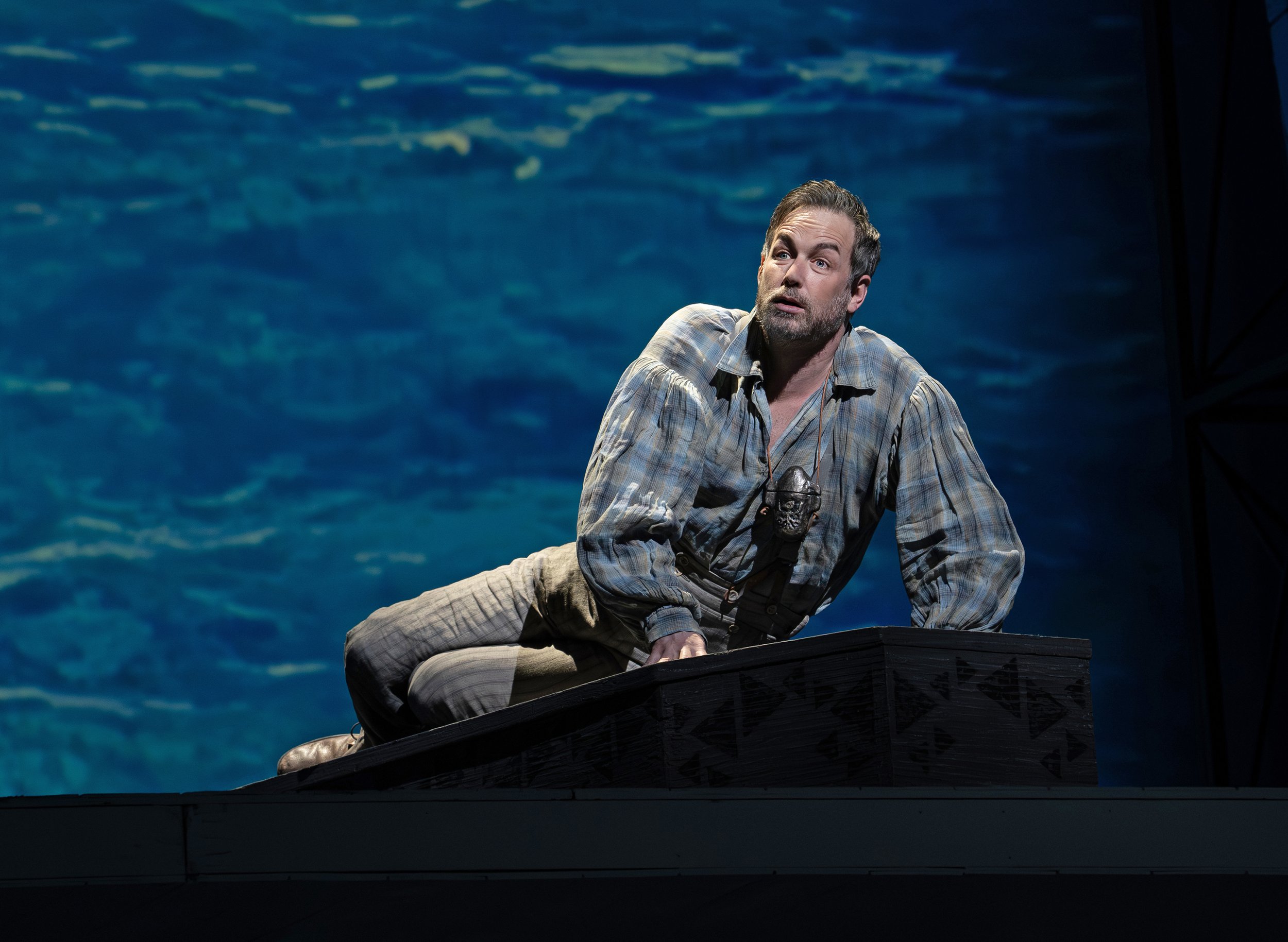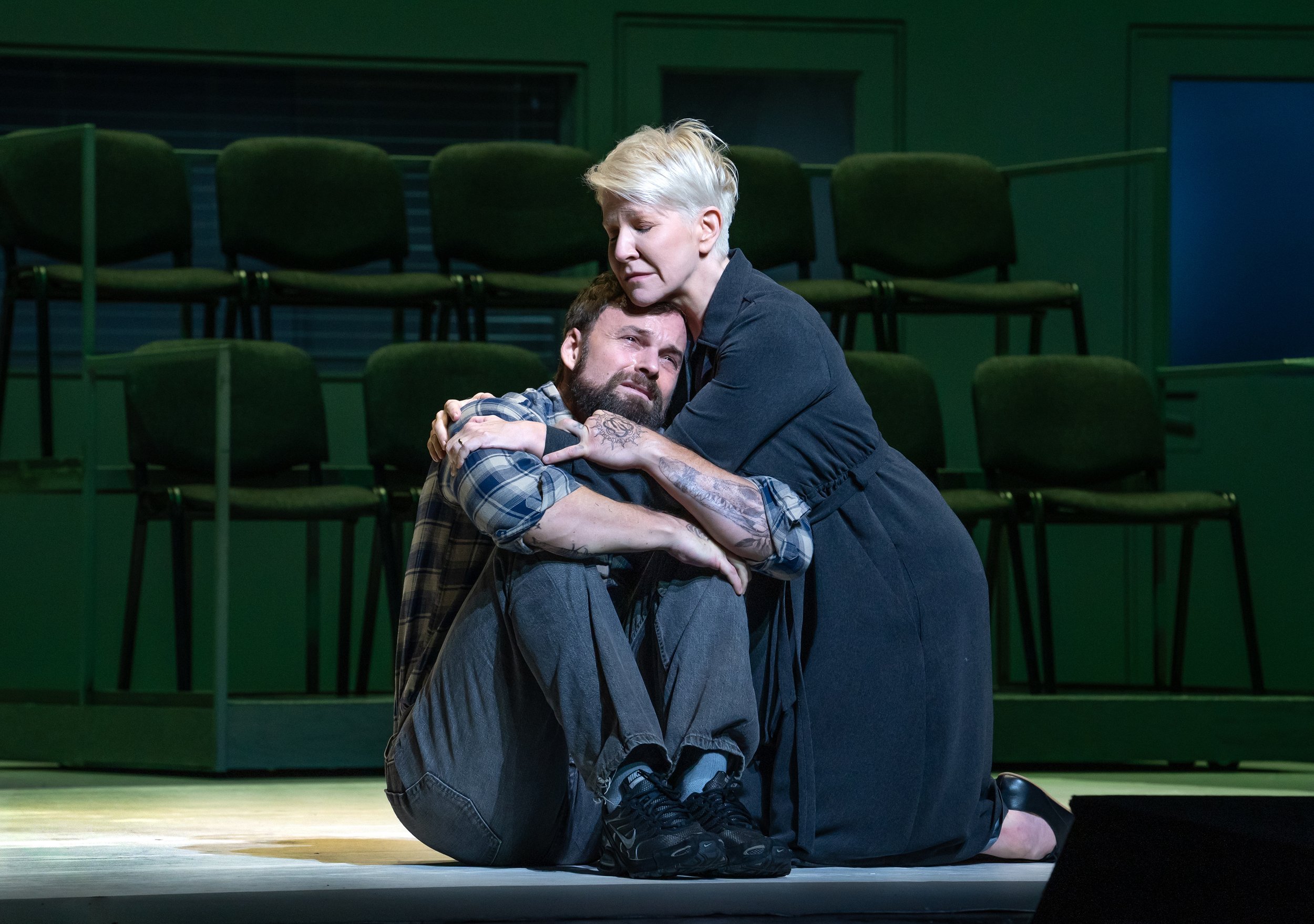Met Opera 2024-25 Review: Moby-Dick
The boats in Moby-Dick (Karen Almond/Met Opera)
The vast sea breathes in gentle, rhythmic swells. Stars, twinkling aloud, wheel overhead, connecting in polygonic constellations before the lines form a mast, sails, and ropes, until the whaling ship Pequod looms before us. The water is deceptively calm, giving no sign of the “dumb brutes” in the deep, able to ram the ship to the ocean floor in splinters. This is the opening seascape that greets you in the overture of Jake Heggie’s monumental Moby-Dick, making its company premiere the season after Heggie’s Dead Man Walking made it to the Met to critical acclaim.
Ryan Speedo Green in Moby-Dick (Karen Almond/Met Opera)
Right after that overture, a corner of the curtain curls up to reveal mariners peacefully sleeping belowdecks. Peacefully, that is, until the heavily tattooed Polynesian prince-harpooneer Queequeg arises, kneels, and starts chanting a prayer — fune, fune ala. This speedily arouses the ire of the sleep-deprived Greenhorn (haven’t we all been there?), who unleashes a tirade against religion. This is the beginning of a beautiful friendship. As Queequeg, Ryan Speedo Green was dignified and sonorous, and Stephen Costello turned in some of his best work at the Met to date as Greenhorn, a young sailor with no family nor identity. The role suits his sweet, valorous voice so well that it could have been written for him. Oh, wait, it was. Costello’s characterization of the unformed and naïve Greenhorn, credibly conveying a sense of wonder at the world and later loss of innocence and prejudices, was a pleasure to experience.
Alex Boyer in Moby-Dick (Ken Howard/Met Opera)
Jumping in for an indisposed Brandon Jovanovich, tenor Alex Boyer made an excellent Met debut as the fatally obsessed Captain Ahab. He sounds (and is) rather young for the grizzled and embittered Ahab, who has spent 40 years at sea since age 18. Nevertheless, Boyer threw himself into the part with a frightening gleam in his eye, steadily cresting every high note (of which Ahab has plenty). He’ll sing Third Jew later this season in Salome, but given his performance in Moby, the Met ought to hire him back for bigger roles soon. Meanwhile, five days after the show, I’m still trying to figure out how they made Ahab’s peg leg work.
Peter Mattei in Moby-Dick (Karen Almond/Met Opera)
Peter Mattei has been under the weather, but this showed through only in one or two narrowly missed high notes. For most of the evening, the Swedish baritone sounded like his usual self, with heavenly legato and one of the most truly beautiful, butter-smooth male voices in the industry. A lanky 6’4”, he easily commanded the stage and gave a heartbreaking portrait of Starbuck, the first mate and lone voice of reason on the ship, who longs to return to his wife and son in Nantucket. The highlight of the evening (and the score) was Starbuck’s scene “He would have shot me,” sung with tortured heartache, when Starbuck contemplates killing sleeping Ahab to save the ship from its doom. Ultimately, the Quaker sailor is unable to pull the trigger, and at the end (spoiler alert) everyone dies but Ishmael. Starbuck was just too good a man.
Malcolm MacKenzie and Janai Brugger in Moby-Dick (Karen Almond)
Janai Brugger revealed a luminously warm soprano as the cabin boy Pip (it’s a trousers role), as if one of the stars from the night sky in the overture had descended to sing. She was entertainingly chirpy and carefree in Act 1, prancing about with her tambourine, and lost and tense in Act 2, after the trauma of being lost in the sea for days drives Pip mad. William Burden and Malcolm MacKenzie were solid as the comedic duo Flask and Stubb, and under Karen Kamensek’s guidance, the superb Met Orchestra did full justice to Heggie’s score in many vivid colors. Speaking of the score, it is captivating, delicious, and sweepingly grand, more consistently classical than Dead Man Walking.
It’s well-known (or ought to be) that whenever two characters start planning for their beautiful future together once All This is over, there’s a good chance at least one of them is going to die. It’s glaringly unsubtle in Moby-Dick — immediately after Greenhorn and Queequeg agree to visit Queequeg’s island, Kokovoko, in the duet “Far from here we shall travel,” Queequeg cries out in pain and falls ill. He bids a touching adieu to Greenhorn and has a coffin made, and is solemnly carried off. Later in the act, when Moby-Dick is finally sighted, Queequeg makes a startling reappearance with no explanation. That’s one of the uneven spots in the opera.
Unusually, Leonard Foglia’s staging is the same one from Moby’s world premiere in 2010, but it’s easy to see why it was kept. It’s clever and innovative (I mean that positively), depicting the boats by projecting the outlines onto a wall around rungs for the singers to sit on. You can see the results in the picture at the top of this post. There’s no wasted space on the stage, full of ropes and tackle, but the singers still had room to move about, and — joy of joys — there is no turntable.
Stephen Costello in Moby-Dick (Karen Almond/Met Opera)
My main quibble is that the White Whale’s destruction of the Pequod was not rendered effectively enough; you can’t really tell what’s happened to Ahab nor the ship, nor is there any chorus of “Aaaaaahhh!!!” Starbuck cries out “Oh, Mary! Oh, my boy!” as he clings to the mast (which briefly got stuck as the stagehands tried to pull it offstage). The projection of Moby-Dick, in our only and brief glimpse of him, is utterly bizarre, but the ending is wonderfully done. Greenhorn is the sole survivor, clinging to Queequeg’s coffin — which is decorated with the same patterns as the harpooneer’s tattoos. He is spotted by another ship and asked who he is. After a pause, he replies “Call me Ishmael.” The beginning is the end. Ishmael has come a ways from ranting about “Lents, prayers, and Ramadans” to bestowing a biblical name upon himself.
Sadly, Moby is not getting an HD cinema broadcast, which means your only chance to see it is to hightail it to Lincoln Center. It’s a whale of a time (couldn’t resist) and tickets are going like fresh fruit after an ocean voyage. All aboard, opera lovers!









